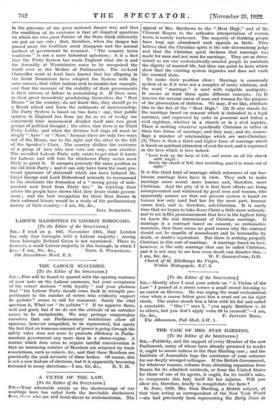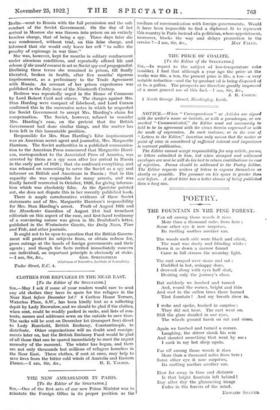THE CASE OF MRS. STAN HAI:WING. [To the Editor of
the SPECTATOR.] Sin,—Publicity, and the support of every Member of the new Parliament, many of whom have already promised to render it, ought to secure redress in the Stan Harding case ; and the Institute of Journalists begs the assistance of your columns for our deeply wronged colleague. If the British Government, for whatever reasons, refrains from obtaining reparation from Russia for its admitted misdeeds, or from the United States for those of one of its agents, it ought, for its credit's sake, to 'compensate this lady itself for her injuries. Will you allow me, therefore, briefly to recapitulate the facts ? In June, 1920, Mrs. Stan Harding, a British subject, at that time acting as correspondent of the New York World —she had previously been representing the Daily News in
Berlin—went to Russia with the full permission and the safe conduct of the Soviet Government. On the day of her arrival in Moscow she was thrown into prison on an entirely baseless charge, that of being a spy. Three days later she was condemned, without trial, on this false charge, and informed that she would only leave her cell " to suffer the penalty of espionage in war time."
She was, however, kept for months in solitary confinement under atrocious conditions, and repeatedly offered life and release if she would consent to act as Soviet spy and propagandist. Declining these terms she remained in prison, till finally liberated, broken in health, after five months' rigorous imprisonment, as a preliminary to the Trade Agreement with Russia. An account of her prison experiences was published in the July issue of the Nineteenth Century.
Redress was repeatedly urged in the House of Commons by Lord Robert Cecil and others. The charges against Mrs. Stan Harding were compact of falsehood, and Lord Curzon confirmed this in the successive notes in which he requested the Soviet Government to accept Mrs. Harding's claim for compensation. The Soviet, however, refused to consider Mrs. Harding's case, on the pretext that the British Government had done similar things, and the matter has been left in this lamentable position.
Responsible for Mrs. Stan Harding's false imprisonment was an American secret agent and journalist, Mrs. Marguerite Harrison. The Soviet authorities in a published communica- tion to the American Press announced that Marguerite Harri- son, correspondent to the Associated Press of America, was arrested by them as a spy soon after her arrival in Russia in the early part of 1920 ; that she confessed everything, and was released on consenting to serve the Soviet as a spy and informer on British and Americans in Russia ; that in this capacity she was responsible for many arrests, and was finally herself rearrested in October, 1920, for giving informa- tion which was absolutely false. As the Spectator pointed out, she does not dispute this in her recently published book.
There is ample corroborative evidence of these Soviet statements and of Mrs. Marguerite Harrison's responsibility for Mrs. Stan Harding's arrest. Truth of August 16th and the Manchester Guardian of August 21st had trenchant editorials on this aspect of the case, and first-hand testimony of a convincing nature was given in Mr. Brailsford's letter, published in the Westminster Gazette, the Daily News, Time and Tide, and other journals.
It ought not to be open to question that the British Govern- ment will protect its subjects from, or obtain redress for, gross outrage at the hands of foreign governments and their agents ; and though the facts recited immediately concern one individual, an important principle is obviously at stake.
Tudor Street, E.C. 4. —I am, Sir, &c., GEO. SPRINGFIELD
(Chairman of Executive, Institute of Journalists).











































 Previous page
Previous page